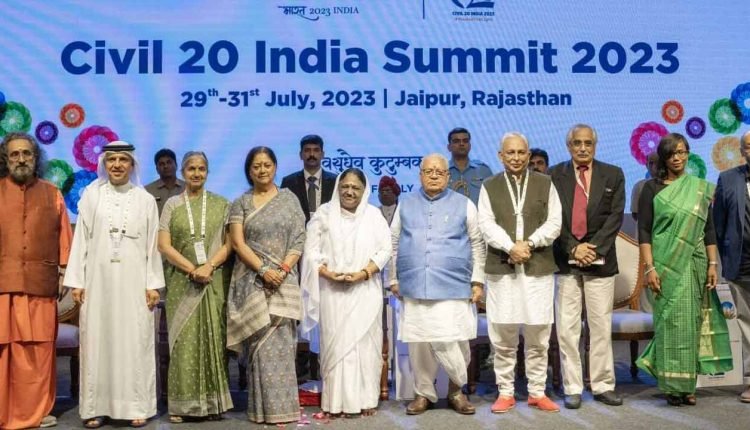World must embrace ancient Indian traditions of nature conservation: Kalraj Mishra
Hyderabad/JAIPUR, July 31, 2023: The three-day Final Summit of Civil20 (C20), an official Engagement Group of G20, concluded at Jaipur with presentation of the C20 Communique, a grassroots survey and policy recommendations developed by its 16 Working Groups. These important documents were presented to the G20 Secretariat and representatives of G20 Brazil at the Summit.
Amma, Mata Amritanandamayi Devi, Chair, C20 India, also officially handed over the leadership of C20 to Brazil after successful conclusion of C20 India. More than 800 delegates were present at the event, including civil society organizations from around the globe, distinguished experts from renowned institutions, and G20 officials.
Prominent dignitaries attended the valedictory function including Shri Kalraj Mishra, Hon’ble Governor, Rajasthan; Smt. Vasundhara Raje, Vice President, BJP; Amma, Sri Mata Amritanandamayi Devi, Chair, C20; Shri Vijay Nambiar, Sherpa C20 India; Sri M, Core Committee Member, C20; Swami Amritaswarupananda Puri, Troika, C20 & Vice Chairman, Mata Amritanandamayi Math; Shri Athayde Motta, Executive Director, Abong; and Élisabeth Moreno, ex-Minister Delegate in France for Equality Between Women & Men, Diversity & Equal Opportunities.
Said Shri Kalraj Mishra, Hon’ble Governor, Rajasthan: “As we focus on the needs of economic and social development, it is also necessary to pay attention to environmental conservation. As the world makes efforts to tackle the challenges of climate change, we need to look back at Indian culture which has a tradition of worshiping trees and connecting them with the divine. We have to embrace our ancient traditions of nature conservation and promoting awareness about these for future development. This work should be carried out on a large scale.”
Shri Kalraj Mishra added:“Niti Aayog and the United Nations are working on a framework for continuous development and cooperation in India. It is important that our foundation for this is based on four strategic pillars of People, Prosperity, Planet and Participation. These pillars are interconnected and focus on six result areas: Health & Wellbeing; Nutrition & Food Security; Quality Education; Economic Development & Decent Work; Environmental Sustainability, Climate & Resilience; and Empowerment of People, Communities, & Institutions. It is necessary to advance these foundations and targeted outcomes under Civil-20.”

Shri Kalraj Mishra said: “Civil society organisations can play a huge role in shaping India’s development plans and policies according to the aspirations of the common people. They can help bridge the gap between large-scale initiatives and their practical implementation for the benefit of the people and reducing inequality. There is still much to be done in addressing the challenges of gender inequality, continuous development, climate change and environmental balance. We must work on integrating our rich cultural traditions related to environmental conservation into modern practices. We must learn from our traditions of tree worship and nature conservation. We must connect the modern generation with the traditions of love and care for animals within the framework of environmental balance. We have to focus on involving the younger generation in the development of skills and values that align with Indian culture.”
Smt. Vasundhara Raje, Vice President, BJP and ex-Chief Minister of Rajasthan, said: “The COVID pandemic was a testament to both the unpreparedness of nation states and the resilience of humanity. Together, governments, civil society, and science successfully combated the disease and vaccinated majority of the adult population. The spirit of cooperative federalism flourished. However, amidst all our triumphs, we must heed the warning from Mother Nature, as our relentless pursuit of physical comfort is leading to reckless depletion of natural wealth. Our thirst for energy poses a grave threat to the very planet that sustains us.”
She added, “At this moment in history, we face challenges of our own making and must accept collective responsibility. All cultures and nations must unite to reduce demands on scarce resources, prioritize reuse, and embrace recycling to avert the dire future of oblivion. As representatives of civil society, we must lead the charge in advocating sustainable practices, conservation, and renewable energy. We must ensure that extreme climates do not disproportionately harm the most vulnerable among us. To achieve ecological and financial justice, we must engage in inclusive development processes that uphold principles of gender equality. Collaboration between governments and civil society is essential to effectively address these critical issues.”
Said Swami Amritaswarupananda Puri, Troika, C20 & Vice Chairman, Mata Amritanandamayi Math: “Amma, Sri Mata Amritanandamayi Devi served as our sole inspiration and guiding light for the remarkable success of C20 in India. This was possible only because of her divine leadership and guidance. As we draw the final curtains on the C20 final summit, we thank all the people and organizations whose unwavering commitment and collective support made this possible. A special word of thanks to civil society organizations for their commitment for promoting social justice, human rights, and sustainable development. Together, as global community, we have taken a step forward in building a more equitable, sustainable and compassionate world as we leave this C20 Summit with new ideas and renewed determination. But let us remember that our work has only just begun.”
The 16 Working Groups of C20 have proposed a wide array of policy recommendations on each of their thematic areas. They have also come up with specific examples of successful work that has already been done by civil society organizations in each area of focus which could be replicated elsewhere in the world.
The Civil20 Summit serves as a platform for experts, advocates, and policymakers to convene, fostering idea exchange and presenting actionable policy recommendations to the G20. It concentrates on critical global issues to shape and influence policies that advance sustainable development, inclusivity, and a better future for all.
Amma, Sri Mata Amritanandamayi Devi, is the Chair of C20.
Next Story :
Now you can get the latest stories from Indtoday on Telegram every day. Click the link to subscribe. Click to follow Indtoday’s Facebook page and Twitter and Instagram. For all the latest Hyderabad News updates






